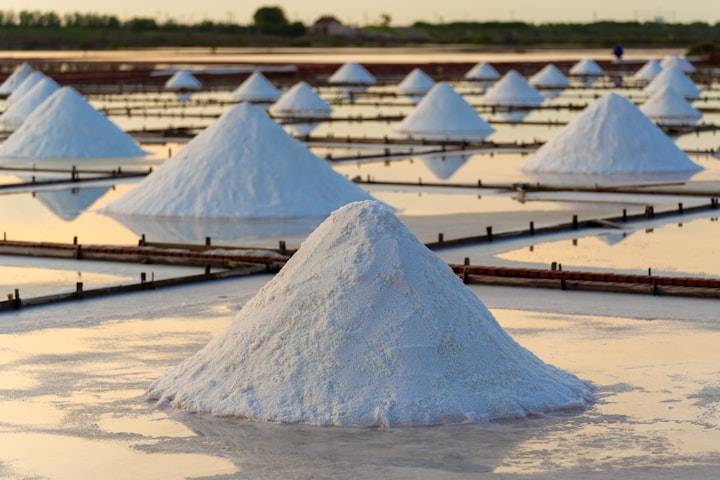History and Significance of Salt
Salt, a simple compound made of sodium and chloride, has played an essential role in human civilization for thousands of years. Its significance goes beyond mere seasoning; it has influenced economies, cultures, and even the course of history.
Ancient Beginnings
The history of salt dates back to prehistoric times when early humans recognized its importance for food preservation and flavour enhancement. The earliest evidence of salt production comes from ancient China, where salt was harvested from saltwater and salt lakes around 6000 BC. In Egypt, salt was vital for mummification processes, and it was used to preserve fish and meat, ensuring that food could be stored for extended periods.
The Romans, too, recognized salt's value, referring to it as “sal,†from which the word "salary" is derived. Roman soldiers were sometimes paid in salt, highlighting its economic importance. Salt was so precious that it became a symbol of wealth and status; the phrase "worth one's salt" stems from this historical context.
Salt in Trade and Economy
Salt’s value led to the establishment of trade routes and economies centered around its production. The Mediterranean region became a hub for salt trade, with cities like Venice and Genoa thriving on the salt trade. In the Middle Ages, salt was often referred to as "white gold." The trade routes expanded as explorers sought new sources of salt, which had significant implications for global commerce.
In West Africa, salt was so highly valued that it was exchanged for gold. The city of Timbuktu became a major trading center, where salt from the Sahara Desert was traded for gold, ivory, and other goods. This trade not only enriched local economies but also contributed to the cultural exchanges that defined the region.
Technological Advances
As societies advanced, so did methods of salt production. By the Middle Ages, techniques such as solar evaporation and boiling brine became commonplace in Europe. The industrial revolution further transformed salt production. The invention of the salt mine allowed for large-scale extraction, significantly increasing the availability and reducing costs.
In the United States, the discovery of extensive salt deposits, particularly in places like Michigan and Ohio, allowed for the mass production of salt. This led to its widespread availability, which changed culinary practices and food preservation methods.
Culinary Uses
Salt is crucial in cooking and food preservation. Its ability to inhibit bacterial growth makes it an effective preservative. Before refrigeration, salting was the primary method of preserving meat and fish, allowing people to store food for long periods. Techniques such as curing and brining became essential for food preservation, leading to the development of various culinary traditions.
Globally, salt is used in countless cuisines. In Asian cooking, salt enhances flavors and balances the sweetness of ingredients. In Mediterranean diets, salt is used in dishes like olives and feta cheese, where it not only preserves but also adds distinct flavors. The diverse uses of salt across cultures highlight its role as a fundamental ingredient in human diets.
Cultural and Spiritual Significance
Salt also holds deep cultural and spiritual significance. In many traditions, salt is seen as a symbol of purity and preservation. It is used in various rituals, from the Jewish practice of using salt in blessings to the ancient Roman custom of throwing salt over one’s shoulder to ward off evil spirits. In Hinduism, salt is often used in religious ceremonies, signifying the importance of purity.
Additionally, salt is often associated with hospitality. In many cultures, sharing salt with guests is a gesture of friendship and goodwill. This practice underscores salt's role as a communal and social element in human relationships.
Environmental and Health Considerations
While salt is essential for human health, its overconsumption has become a significant public health issue. High salt intake is linked to various health problems, including hypertension, heart disease, and stroke. As a result, health organizations worldwide have initiated campaigns to reduce salt consumption. This has led to the development of low-sodium products and increased public awareness of dietary habits.
Moreover, the environmental impact of salt production cannot be overlooked. Traditional salt mining can lead to habitat destruction and pollution, while modern methods like solar evaporation can deplete local water sources. As global populations grow and demand for salt increases, sustainable practices in salt production have become imperative.
Modern Applications
In contemporary society, salt's applications extend beyond culinary uses. It plays a crucial role in various industries, including chemical manufacturing, water treatment, and even agriculture. Salt is a primary ingredient in the production of chlorine and sodium hydroxide, which are vital for numerous industrial processes.
Additionally, salt is used in de-icing roads during winter, highlighting its importance in public safety. The use of salt in various applications reflects its versatility and enduring significance.
Conclusion
Salt's rich history and multifaceted roles in human civilization illustrate its profound impact on society. From ancient preservation methods to its place in modern industry, salt has shaped economies, cultures, and diets worldwide. While its importance continues to be recognized, the challenges associated with its use and production necessitate a balanced approach to ensure that salt remains a vital and sustainable resource for future generations. As we continue to explore its potential and address the health implications of its consumption, salt remains an enduring symbol of human ingenuity and adaptability.



No comments yet
Be the first to share your thoughts!